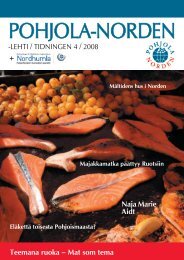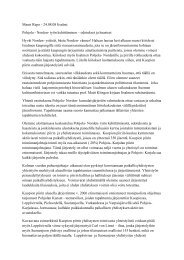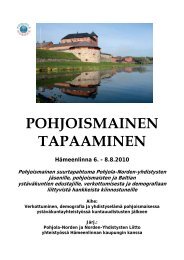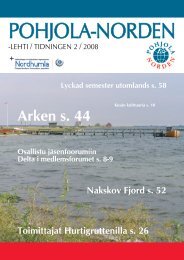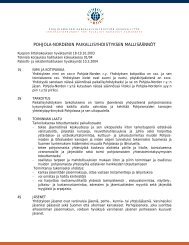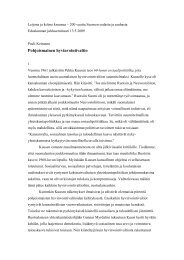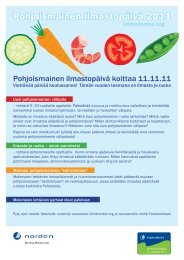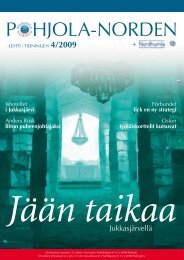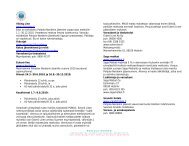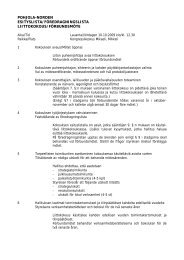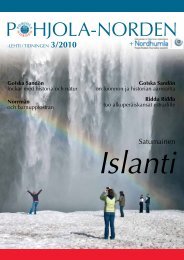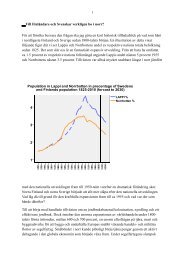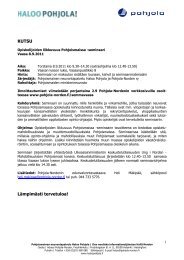The Nordic Model - Embracing globalization and sharing risks
The Nordic Model - Embracing globalization and sharing risks
The Nordic Model - Embracing globalization and sharing risks
Create successful ePaper yourself
Turn your PDF publications into a flip-book with our unique Google optimized e-Paper software.
supportive interaction of openness <strong>and</strong> collective risk <strong>sharing</strong>. It<br />
follows that the constitutive elements of the model – including<br />
tax, transfer <strong>and</strong> spending policies as well as labour market institutions<br />
<strong>and</strong> labour force participation rates – cannot be evaluated<br />
in isolation but have to be seen as part of a comprehensive <strong>and</strong>,<br />
to some extent, coherent system.<br />
This chapter first points to a number of shared attributes of<br />
the <strong>Nordic</strong> countries. <strong>The</strong>se cover areas such as labour market<br />
institutions <strong>and</strong> performance, attitudes <strong>and</strong> policies with regard to<br />
<strong>globalization</strong> <strong>and</strong> new technologies, <strong>and</strong> the design of the welfare<br />
state <strong>and</strong> social policies. However, the focus is not on the visible<br />
characteristics as such but on what we perceive as essential for<br />
underst<strong>and</strong>ing the performance of the <strong>Nordic</strong> countries <strong>and</strong> the<br />
way their policies have evolved over time. We emphasize two basic<br />
<strong>and</strong> interrelated policy orientations that have played a fundamental<br />
role for a long time <strong>and</strong> notably in the post war period: free trade<br />
(in an increasingly broad sense) <strong>and</strong> collective mechanisms for risk<br />
<strong>sharing</strong>. <strong>The</strong> <strong>Nordic</strong> countries have benefited from their openness<br />
to <strong>globalization</strong> in the form of higher productivity <strong>and</strong> incomes.<br />
<strong>The</strong> welfare state <strong>and</strong> labour market institutions have nevertheless<br />
given protection against the <strong>risks</strong> associated with economic<br />
openness. We argue that collective risk <strong>sharing</strong> facilitates acceptance<br />
of <strong>globalization</strong> by reconciling the flexibility required by open<br />
markets with the security that workers <strong>and</strong> citizens aspire to. This<br />
has helped the <strong>Nordic</strong> countries to adapt institutions <strong>and</strong> policies,<br />
though often only under the pressure of events, so as make it possible<br />
to benefit from <strong>and</strong> cope with the process of <strong>globalization</strong>.<br />
Globalization allows<br />
higher incomes but<br />
requires structural<br />
adjustments, a process<br />
with winners <strong>and</strong><br />
losers. Risk <strong>sharing</strong><br />
enhances safety <strong>and</strong><br />
makes <strong>globalization</strong><br />
more acceptable.<br />
2.1 FREE TRADE AND THE MARKET MECHANISM<br />
<strong>The</strong> <strong>Nordic</strong> countries are wedded to free trade <strong>and</strong> have, with some<br />
sectoral exceptions, been in favour of free trade already for a very<br />
long time. This policy orientation is easily underst<strong>and</strong>able for any<br />
small country. It is particularly rational for countries with a narrow<br />
resource base <strong>and</strong> peripheral location; access to international<br />
markets is essential as a precondition for attaining high living st<strong>and</strong>-<br />
Free trade is a must<br />
for small countries<br />
with a narrow resource<br />
base <strong>and</strong><br />
peripheral location<br />
32 · <strong>The</strong> <strong>Nordic</strong> <strong>Model</strong>




